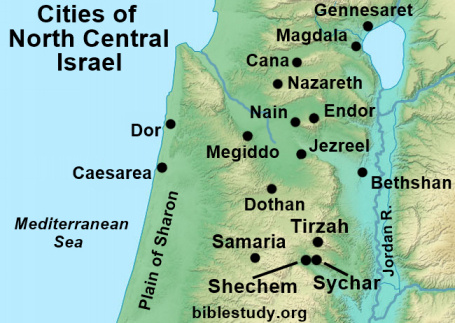Bible Meaning: Watch (station) mountain, guardianship
Strong's Concordance #H8111, #G4540
The city of Samaria came into existence after one of Israel's kings decided it was time to move.
Shechem, after a united Israel split in 930 B.C., became the first capital of the Northern Kingdom under Jeroboam (1Kings 12:25). He soon changed it, however, to Tizrah (1Kings 14:17). The city stayed Israel's capital until the reign on Omri who, after ruling from Tizrah for six years, purchased a hill he named Samaria after its owner Shemer (1Kings 16:24). He then made the bought property his residence.
The word Samaria first referenced Israel's capital but later was a synonym for the entire northern kingdom (1Kings 18:2, Jeremiah 31:5, Ezekiel 16, etc.). The city stayed Israel's capital from about 879 to 723 B.C. when the kingdom was conquered and taken captive by Assyria.
New Testament References
The Roman province of Judea was originally formed in 6 A.D. It was composed of the regions (districts) named Samaria, Judea itself (where Jerusalem is located) and a part of Idumea (another name for the land of Edom).

At the time of the New Testament, those living in this region were hated by most Jews living south of the territory. This animosity, which was hundreds of years old by the time of Jesus' ministry, produced some extreme behavior.
Jews, for example, as they traveled between Galilee and Judea, were known to bypass the area by making the much longer journey through Perea!
Jesus' behavior toward those in Samaria flew in the face of the bitter attitudes held by many. He rebuked James and John for wanting to destroy one of their cities with fire from heaven (Luke 9:51 - 56). He also healed a Samaritan leper (Luke 17:16) and was willing to preach the gospel to them (John 4:39 - 42). His famous Good Samaritan parable used an example of a kind and merciful resident of the area to highlight the self-righteousness and hard hearts of many Jews (Luke 10:30 - 37).
Important Verses
1Kings 16:23 - 24
In the thirty and first year of Asa king of Judah began Omri to reign over Israel, twelve years: six years reigned he in Tirzah. And he bought the hill Samaria of Shemer for two talents of silver, and built on the hill, and called the name of the city which he built, after the name of Shemer . . .
2Kings 17:6
In the ninth year of Hoshea the king of Assyria took Samaria, and carried Israel away into Assyria, and placed them in Halah and in Habor by the river of Gozan, and in the cities of the Medes . . .
John 4:1 - 3, 5, 9
When therefore the Lord knew how the Pharisees had heard that Jesus made and baptized more disciples than John, (Though Jesus himself baptized not, but his disciples,) He left Judaea, and departed again into Galilee.
Then cometh he to a city of Samaria, which is called Sychar, near to the parcel of ground that Jacob gave to his son Joseph . . .
Then saith the woman of Samaria unto him, How is it that thou, being a Jew, askest drink of me . . . for the Jews have no dealings with the Samaritans.
Acts 1:7 - 8
And he (Jesus) said unto them (the disciples), It is not for you to know the times or the seasons, which the Father hath put in his own power. But ye shall receive power, after that the Holy Ghost (Spirit) is come upon you: and ye shall be witnesses unto me both in Jerusalem, and in all Judaea, and in Samaria, and unto the uttermost part of the earth.
Acts 8:4 - 6
Therefore they that were scattered abroad went every where preaching the word. Then Philip went down to the city of Samaria, and preached Christ unto them. And the people with one accord gave heed unto those things which Philip spake, hearing and seeing the miracles which he did.